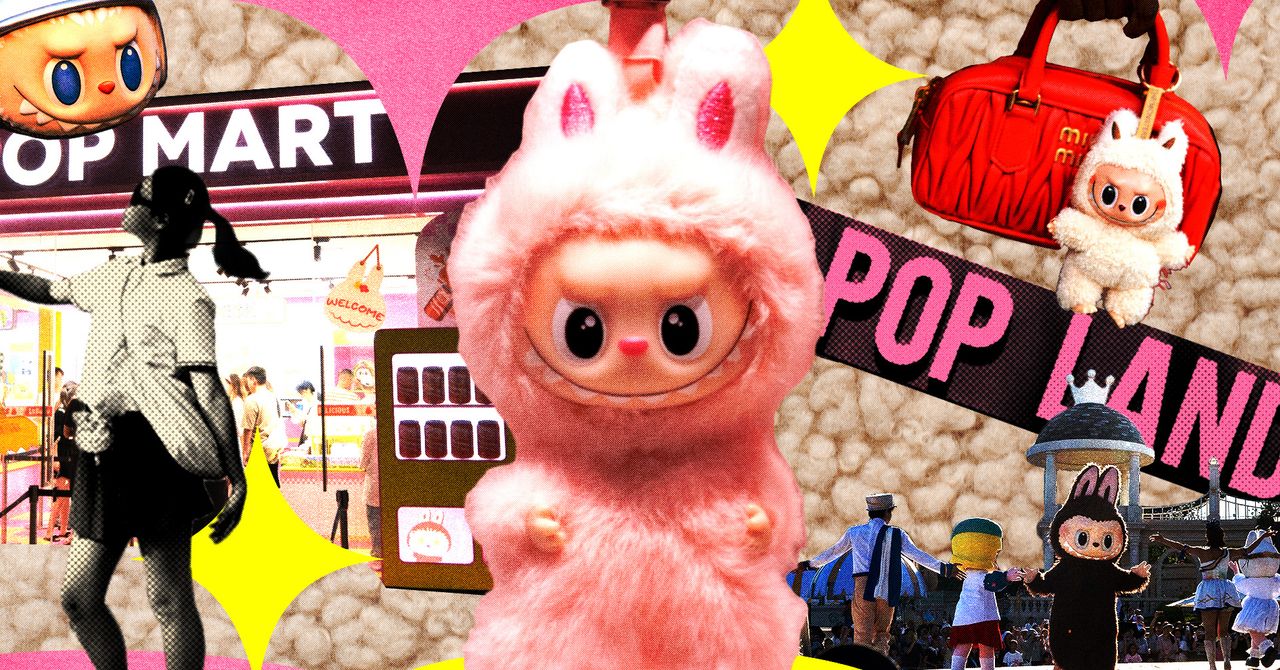
The day after I failed to secure a Labubu from Pop Mart’s original store, I decide to console myself with a visit to Pop Land, the company’s 10-acre theme park in central Beijing—and perhaps the clearest sign that it intends to come for Disney’s lunch. (“Our art toys are like Disney’s movies,” Wang says in A Company One of a Kind. “They use movies to reach consumers, cultivate fans, and build IP and fan communities. We do it through art toys.”)
Pop Land is about 1 percent the size of Universal Studios in Beijing and Shanghai’s Disneyland, but unlike other theme parks, it sits right by the consulate district and a few subway stops away from Beijing’s most populous business areas. It’s in a city green space, which meant that Pop Mart wasn’t allowed to move even a single tree. Instead, the company renovated an abandoned building on the property and named it Molly’s Castle. A leafy area became Labubu Adventure Forest, though it looks much brighter and more kid-friendly than Lung’s original depiction. At one end of the forest, actors put on a “Warriors Training Camp” in full-size Labubu suits.
I stop for lunch at the park’s restaurant, on the third floor of Molly’s Castle. The minute I’m seated at a table and inform the waitress I came alone, she puts a 23-inch-tall plush doll in the chair opposite me. My dining buddy is Zimomo, the male chief of the Labubu clan in the original children’s book and one of the rarest Pop Mart products sold. Throughout my lunch, other Pop Land visitors keep coming over to ask whether I bought the Zimomo doll myself and if they can take a picture of it. I feel like I’m dining with a celebrity.

Observers of American internet culture have noted a vibe shift this year, an embrace of Chinese coolness. Just look what happened in January when the US government attempted to ban TikTok over its ties to the country: Users began preemptively flocking to an even more Chinese alternative, RedNote. Even on US-made platforms, people marvel at videos of gleaming Shenzhen factories, the cyberpunk aesthetics of Chongqing, and, yes, Labubu.
After I returned to the States with my King and Queen Labubus, I kept having stress dreams about restocking announcements. I was still thinking about the one that got away: “Thai sis.”
I thought about how great it would feel to own the golden-robed Labubu. When people asked me about my prize, as they most definitely would, maybe I’d tell them my Pop Mart odyssey—how a journalist set out to understand the Labubu mass psychosis of 2025, only to fall prey to it himself, how I battled bots and huangniu to get mine, that what makes a Labubu special isn’t its resale value but the lengths people go to obtain it and the online community they build in helping each other get one. Maybe I’d mention the surreal theme park in Beijing that’s being expanded to twice its size and the cartoon series that’s in production, potentially keeping this Chinese cultural juggernaut going long into the future. And maybe the person listening to me, by the end, would want a Labubu of their own.
I spent an anxious week checking the Thai Pop Mart store and local ecommerce platforms. Buying a Lafufu “Thai sis” felt like a cop-out, and I agonized over contributing to the scalper economy.
Finally, though, I gave in: I told a friend in Bangkok to just buy one from the resellers in the mall, no matter the price. Eventually, he got one for $75. It flew thousands of miles and now sits in a corner of my living room in New York, still in its original plastic packaging. After all, it’s too precious to hang on my backpack. I haven’t been to a Pop Mart store since.
Let us know what you think about this article. Submit a letter to the editor at mail@wired.com.






